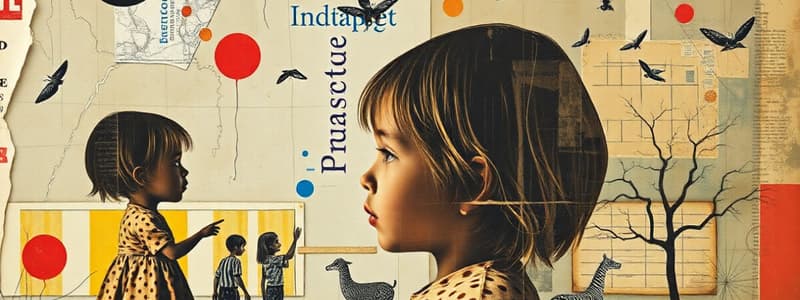Podcast
Questions and Answers
Which statement accurately represents the behavior of a 3-year-old child?
Which statement accurately represents the behavior of a 3-year-old child?
- Talkative, inquisitive about the environment
- Aggressive, shows off
- Boisterous, tattles on others
- Helpful, wants to assist with chores (correct)
What is a common understanding regarding a 4-year-old boy frequently touching his penis?
What is a common understanding regarding a 4-year-old boy frequently touching his penis?
- It suggests a fear of castration.
- It reflects a normal curiosity about sexuality. (correct)
- It signifies an abnormal behavior requiring counseling.
- It indicates a potential genital rash.
Which of the following responses demonstrates animism in a child's reasoning?
Which of the following responses demonstrates animism in a child's reasoning?
- To hide behind when they are scared. (correct)
- Because God made them that way.
- So I can have shade over my sandbox.
- For the squirrels to play in.
What behavior is most likely to occur in children who are unable to express themselves verbally?
What behavior is most likely to occur in children who are unable to express themselves verbally?
Which example best illustrates the concept of associative play?
Which example best illustrates the concept of associative play?
What task is most appropriate to assign to a 5-year-old child?
What task is most appropriate to assign to a 5-year-old child?
What is the primary benefit of including play in a 5-year-old's care plan?
What is the primary benefit of including play in a 5-year-old's care plan?
What behavior is likely to be observed in a 3-year-old when another child approaches to play with their favorite toy?
What behavior is likely to be observed in a 3-year-old when another child approaches to play with their favorite toy?
How can parents demonstrate a concern for their child's safety?
How can parents demonstrate a concern for their child's safety?
How do preschool children typically view objects in the environment?
How do preschool children typically view objects in the environment?
What indicates a potential articulation disorder in a child?
What indicates a potential articulation disorder in a child?
What reaction might parents expect when discussing natural bodily curiosity with their young child?
What reaction might parents expect when discussing natural bodily curiosity with their young child?
What developmental milestone suggests a 5-year-old boy is developing a sexual identity?
What developmental milestone suggests a 5-year-old boy is developing a sexual identity?
Which of the following is true concerning a 4-year-old's sexual behavior?
Which of the following is true concerning a 4-year-old's sexual behavior?
What is a recommended approach for caregivers asking help from a 5-year-old child with chores?
What is a recommended approach for caregivers asking help from a 5-year-old child with chores?
At what age do children typically start becoming curious about death and dying?
At what age do children typically start becoming curious about death and dying?
What is a common characteristic of play for 5-year-old children?
What is a common characteristic of play for 5-year-old children?
What is the most effective response to occasional aggression in a 4-year-old child?
What is the most effective response to occasional aggression in a 4-year-old child?
Which response is most appropriate for a parent concerned about their child's thumb-sucking habit?
Which response is most appropriate for a parent concerned about their child's thumb-sucking habit?
What approach should be taken towards a preschooler's curiosity about body parts?
What approach should be taken towards a preschooler's curiosity about body parts?
When selecting toys for a child with moderate intellectual deficiency, what is the most crucial consideration?
When selecting toys for a child with moderate intellectual deficiency, what is the most crucial consideration?
What should a nurse advise a parent regarding bedtime challenges with their child?
What should a nurse advise a parent regarding bedtime challenges with their child?
What is a typical play preference for a 3-year-old child?
What is a typical play preference for a 3-year-old child?
What unique fear is often observed in preschool-aged children?
What unique fear is often observed in preschool-aged children?
What misconception might parents have about a child with an imaginary friend?
What misconception might parents have about a child with an imaginary friend?
Flashcards are hidden until you start studying
Study Notes
Preschool Developmental Milestones
-
Three-year-old children are helpful and can assist with simple household chores.
-
Preschoolers tend to attribute human characteristics to nonhuman objects.
-
Preschool age is characterized by heightened sexual curiosity, but it is normal for children to be curious about their bodies and sexuality.
-
Preschoolers often engage in associative play, which is a collaborative and interactive form of play where they use their language skills to create scenarios and play together.
-
Preschoolers are egocentric, often becoming angry when others attempt to take their possessions.
-
Preschoolers often have imaginary friends, which is a normal and common developmental stage that can help them address emotional needs like loneliness and fear.
-
The nurse should reassure parents that most children will stop thumb-sucking naturally by school age.
-
Preschool children require a good deal of indirect supervision to protect them from dangers that arise from their immature judgment or social environment.
-
Preschoolers have a short attention span, typically lasting around 15 minutes.
-
Bedtime rituals can help preschoolers transition smoothly into sleep, and it is recommended to establish a consistent routine that includes calming activities such as story-telling, a nightlight, and a glass of water.
Key Facts About Child Development
-
A 5-year-old child can set the table with paper plates.
-
A 4-year-old is experiencing a normal curiosity about sexuality when they frequently touch their genitals.
-
A 4-year-old child who acts out aggressively towards others may benefit from a short time-out period, typically lasting 1 minute for each year of age.
-
Preschool children who experience enuresis (bedwetting) should have their fluid intake limited after dinner.
-
Large construction sets are appropriate toys for preschool-age children.
-
Preschoolers are in the intuitive stage, which is characterized by prelogical thinking based on the outward appearance of objects.
-
Preschool children have a fear of bodily harm, particularly the loss of body parts.
-
Preschoolers often identify with the parent of the same sex and begin to form a romantic attachment to the parent of the opposite sex, indicating a developing sense of sexual identity.
-
Preschoolers often have difficulty expressing themselves verbally and may resort to tantrums or acting out when they can't communicate their needs effectively.
-
Preschool children often have difficulty accepting losing in games, and their understanding of rules can be inconsistent and flexible.
-
Parents should answer their preschoolers' questions about sex when they ask.
-
The nurse should suggest age-appropriate toys and activities for children with moderate intellectual deficiency, considering their mental age rather than their chronological age.
-
A preschool's or nursery school's experience can help children build self-confidence, develop group cooperation skills, and detect early adjustment problems.
-
Preschoolers should be taught not to play in or around vehicles and should never be left alone in a car.
-
Preschoolers will likely reach these developmental milestones by the time they reach kindergarten:
- Increased communication skills
- Control of bodily functions
- Acceptance of separation
Studying That Suits You
Use AI to generate personalized quizzes and flashcards to suit your learning preferences.




